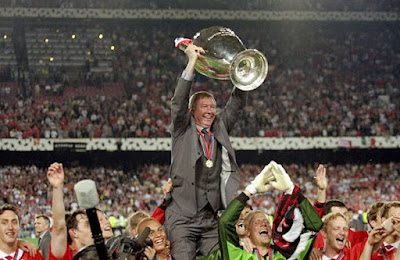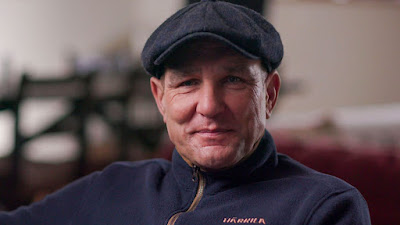If you want to measure how English football changed during the 1990s, listen to former Manchester United chairman Martin Edwards.
In the final episode of BBC2's primetime Open University documentary 'Fever Pitch: The Rise of the Premier League,' Edwards notes that when he took over as the club's chair in 1980 it was worth £2 million.
By the time he left Manchester United in 2000, it was valued at £1 billion.
Adam Hopkins' four part Story Films production charts the birth of the Premier League in 1990 to its growth over the decade into a massive global brand.
But was it the moment when football sold its soul?
The first episode does a good job setting the context of how the Premier League was born.
Football fever had broken out again in England on the back of the national team's success at the Italia 90 World Cup after it reached the semi-finals.
Rupert Murdoch's Sky satellite TV venture was looking for a magnet to draw subscribers in.
After failing to woo mass audiences with subscription movie channels, live football matches were seen as that magnet.
Intoxicated by the way American broadcasters covered sport, there were some laughable attempts to bring some US style razzmataz to live games at Elland Road and Selhurst Park.
The Sky Strikers cheerleaders were introduced before live games and in another sequence we witness a bizarre 'It's A Knockout' style giant sumo wrestling mascots' bout in the centre circle.
However there were other innovations that remain to this day like the idea of 'Monday Night Football'.
Sky Sports executive David Hill explains this concept was exported from the US because they found Monday night NFL games doubled the number of women watching.
The first episode of Hopkins' documentary is very effective in initially setting up how risky Rupert Murdoch's investment appeared to be.
However the rest of the series is an uneven affair, slipping into a routine retread of the great Premier League races and rivalries - all of them involving the team that dominated the decade, Alex Ferguson's Manchester United.
Many of these stories you feel have been covered a hundred times before.
Where the series really does come to life is its tales away from the title races.
It's former Manchester United defender Gary Pallister recalling the circus around his club's French talisman Eric Cantona to the point where he could not even go out for a drink in a hotel without people spitting on him from a mezzanine.
It's former Northern Ireland, Manchester United and Newcastle United winger Keith Gillespie talking about blowing £47,000 in one day thanks to a gambling addiction and then having it exposed in the tabloids.
It's former Queen's Park Rangers and Newcastle United striker Les Ferdinand's observation that a black player would not have had the same sympathy and tolerance shown to him as Cantona after his infamous karate kick on a Crystal Palace supporter spouting racist abuse at him.
All of these anecdotes and observations pepper an otherwise bland retread of football seasons past.
But there are also curious editorial judgements.
It is understandable that Blackburn Rovers' surprise title win in 1994-95 features, along with Newcastle's unsuccessful tilt in 1995/96 and Arsene Wenger's first title at Arsenal in his first season in 1997-98.
However the effect of the Premier League on clubs like Liverpool, Leeds United and Chelsea is pretty much ignored.
While Cantona and David Beckham are inevitably interviewed, it seems odd that Roy Keane - the embodiment of Ferguson's fierce desire to win for much of the decade - is barely mentioned when Gary Neville, Peter Schmeichel, Paul Parker and Gary Pallister are interviewed.
Where's Steven Gerrard, Ruud Gullit or Michael Owen when we have Vinny Jones?
'Fever Pitch: The Rise of the Premier League' documents the insatiable commercial appetite that the success of the league engendered among big business.
Not every commercial venture worked - the final episode charts Rupert Murdoch's ill fated bid to take over Manchester United which was thwarted by fans.
However it serves as a warning about how the game is becoming increasingly detached from its roots.
It raises intriguing questions about the price that has been exacted on the relationship between the game and its fans through the relentless pursuit of profit.
Not all those questions are convincingly answered by this series.
However watching it, it will make you fear for the future of the sport.
As the series unfolds, you can't help feeling that despite the remarkably rapid disintegration of plans earlier this year for a European Super League involving continent's best known clubs, that idea has probably not been put to bed.
The money men will somehow find another vehicle to squeeze more cash out of supporters.
If this series shows anything it is that the beautiful game is not really that beautiful.
It's mutton dressed in bling.
('Fever Pitch: The Rise of the Premier League' was broadcast on BBC2 on September 6-27, 2021)








Comments
Post a Comment